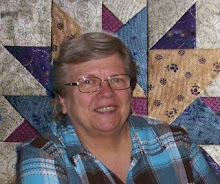It’s been a long while since my last Blogger post. Life gave me some twists and turns and changes. I hope that I can come up with some things to share with you – I enjoy doing that.
On a recent trip, I realized that a light-weight zippered pouch/bag would be just the thing to keep all those chargers together. You know – one for the cellphone, iPad, Kindle, camera, etc. I had used an old pouch that I found in a drawer & knew that I could make a better one.
Why do pouches always have a zipper at the top? I thought a zipper in the middle of the pouch/bag would make the contents more accessible. And here’s what I came up with --

 When I make pouches/bags, I like to encase the ends of the zipper in fabric tubes so then I don’t have to deal with zipper teeth or the heavy zipper tape in the seamlines of the bag.
When I make pouches/bags, I like to encase the ends of the zipper in fabric tubes so then I don’t have to deal with zipper teeth or the heavy zipper tape in the seamlines of the bag.
 Fabric Tubes for ends of zipper:
Fabric Tubes for ends of zipper:
Cut each rectangle for tube 2-1/2” wide (this allows for 1/4” seam & goes around the zipper)
Length to cut – 2-1/4” is enough to allow for clearing ends of zipper tape and will be enough for a seam allowance of 5/8” on the bag.
So, for the Fabric Tubes on my zipper –-
I cut two rectangles -- 2-1/2” wide x 2-1/4” long
 Right sides together, stitch the ends of the fabric tube(s) in 1/4” seam, down the 2-1/4” length. Do not turn right side out, yet.
Right sides together, stitch the ends of the fabric tube(s) in 1/4” seam, down the 2-1/4” length. Do not turn right side out, yet.
 Slip the zipper end into the “unturned” Fabric Tube - that would be right side of zipper to right side of Fabric Tube.
Slip the zipper end into the “unturned” Fabric Tube - that would be right side of zipper to right side of Fabric Tube.
 Above pic shows the Fabric Tubes pinned to each end of zipper.
Above pic shows the Fabric Tubes pinned to each end of zipper.

The orange dotted line shows the stitching line of the Fabric Tube to the zipper.
 After sewing Fabric Tubes in place, pull the Fabric Tube over the end of the zipper tape; the right side of Fabric Tube is now showing and the end of zipper tape is encased in the Fabric Tube – no raw edges showing. Press.
After sewing Fabric Tubes in place, pull the Fabric Tube over the end of the zipper tape; the right side of Fabric Tube is now showing and the end of zipper tape is encased in the Fabric Tube – no raw edges showing. Press.
This would now be called a “Zipper Unit”.
 Now you can take that Zipper Unit and sew it into the bag, treating it just like a zipper.
Now you can take that Zipper Unit and sew it into the bag, treating it just like a zipper.
There are so many tutorials on the web for making pouches/bags, I’ll leave the rest of the construction up to you. And most of them will show you how to insert a zipper and you would just follow those directions and insert a Zipper Unit, which is just a zipper with covered ends. I just wanted to show you how I did my zippers.
Before the sides are sewn, the zipper can be located anywhere on the bag
Towards top/bottom.
At top/bottom
or, centered on bag front – which is what I did with mine.

I chose to use French Seams on the sides of the bag, with the final stitching of the French Seam on the outside of pouch/bag, so I could have something to hold on to when opening or closing the zipper. For the 1st stitching of the French Seam, I use 1/4” seam allowance and then for the 2nd stitching, I used a 3/8” seam allowance. That way, I did not have to trim the 1st seam.
 Uh-oh, looks like there’s room in that pouch/bag!
Uh-oh, looks like there’s room in that pouch/bag!


 When I need to place a motif in a certain area, I like to work on a “grid”, makes it much easier to center. In the Block Worktable, I drew a 7.5” x 5” grid and placed it in Layer 1(in the Quilt Worktable) and placed the butterfly in Layer 2. I could size the butterfly and move it all around that area until I was pleased with the placement. It was easy to get the placement on the actual article cuz I had that grid to reference to.
When I need to place a motif in a certain area, I like to work on a “grid”, makes it much easier to center. In the Block Worktable, I drew a 7.5” x 5” grid and placed it in Layer 1(in the Quilt Worktable) and placed the butterfly in Layer 2. I could size the butterfly and move it all around that area until I was pleased with the placement. It was easy to get the placement on the actual article cuz I had that grid to reference to.














